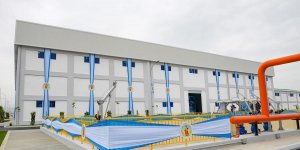In the western regions of our country there are significant reserves of basalt ore, in connection with which, it should be noted that there are prospects for establishing the production of composite materials based on basalt continuous fibers, according to the newspaper “Neutral Turkmenistan”.
Scientists of the Institute of Chemistry of the Academy of Sciences of Turkmenistan are engaged in the development of scientific foundations for the processing of this volcanic rock and are conducting research on its introduction into production.
The production of continuous basalt fiber is a new innovative product, and the production of fittings, shaped pipes, as well as the production of dispersed-reinforced with basalt fiber foam concrete wall blocks can be confidently characterized as extremely promising.
Continuous basalt fibers increase the resistance of concrete to cracks by 3 times, to destruction by 2 times and impact resistance by 5 times. With the same strength demonstrated with other materials, products from basalt fibers have three times less weight.
Thus, 1 ton of composite reinforcement replaces 8-10 tonnes of steel reinforcement. At the same time, basalt products have a wide temperature range: 260–700 (900) degrees Celsius.
Their use in the construction of highways makes it possible to significantly increase the durability and strength of the road surface. An important property of continuous basalt fiber is that it melts at a temperature of 1150 degrees
Celsius. This melting point is significantly higher than that of atendonopes, and approaches the melting point of ceramic fiber. At the same time, it is sold at a price significantly lower than aremide, ceramic, carbon fiber, and at the same time creates specific difficulties in processing and manufacturing.
It is assumed that continuous basalt fiber will find wide application in composite building materials as an additive in the composition of concrete, roof tiles, paving slabs and asphalt, railway sleepers, etc., where a minor reinforcing additive is required to the base material.
In addition, basalt fibers can be actively used in the manufacture of automotive brake pads and linings with a long service life. Basalt brake pads can last as long as the vehicle is in use.
Basalt fibers have high chemical resistance. This property makes it possible to use them in structures operating under the influence of moisture, salt solutions, chemical and alkaline media. This allows consumers to replace metal structures and parts that, under the influence of chemically active environments, are subject to corrosion, with lightweight, durable and corrosion-resistant products.
There is only one conclusion: basalt fiber is a competitive product in terms of material cheapness, chemical resistance, simplicity and reliability, and ease of use. In the coming years, these factors will contribute to its transformation from an innovative product into a consumer product.













